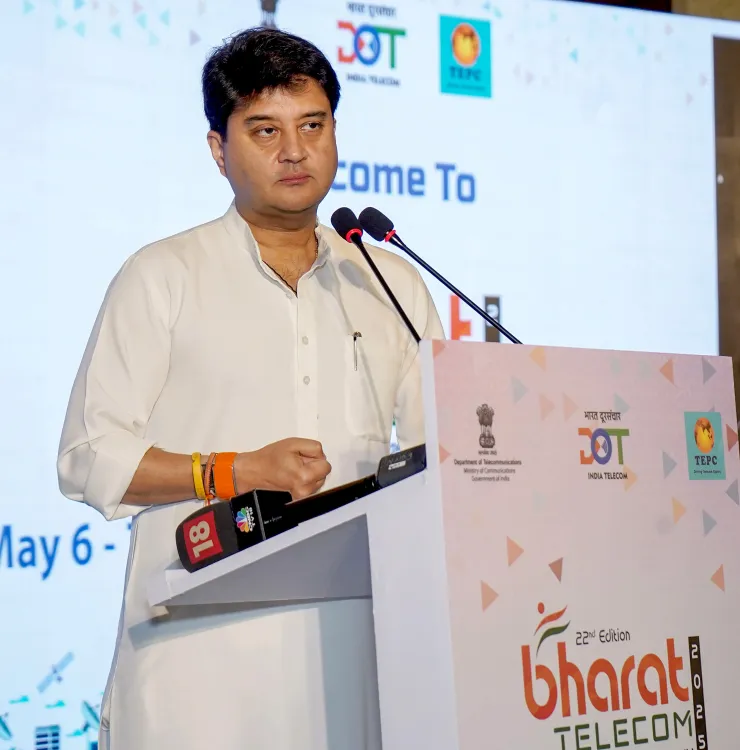Why Are Global Giants Like Apple Investing in India?

Synopsis
Communications Minister Jyotiraditya Scindia highlights Apple and other tech giants' investments in India, showcasing the economic rationale behind these decisions. With significant growth in manufacturing and telecom sectors, India's digital transformation is paving the way for a new era of global partnerships. Discover how this shift is empowering the nation!
Key Takeaways
- Apple is shifting its manufacturing focus to India, enhancing local economic growth.
- India's telecom sector has seen rapid advancements, connecting millions to 5G.
- Government initiatives are pivotal in attracting global tech investments.
- The economic impact includes job creation and increased exports.
- India is transforming from a consumer to a creator in the global tech landscape.
New Delhi, May 6 (NationPress) Communications Minister Jyotiraditya Scindia stated on Tuesday that global technology leaders like Apple recognize the significant economic benefits of establishing manufacturing hubs in India.
While speaking at the Bharat Telecom event, Scindia emphasized that investing in India is not merely a gesture of goodwill; it is a strategic economic decision for every OEM (original equipment manufacturer).
He noted, "Apple is set to source and manufacture all of its mobile devices in India in the coming years. By investing in India, you are opting for affordability, reliability, and originality," he stated.
Recently, Apple CEO Tim Cook revealed that the company will source a majority of its iPhones for the U.S. market from India during the April-June quarter, while China will continue to serve other markets. This decision comes in response to the significant increase in U.S. tariffs on exports from China, as announced by President Donald Trump.
Scindia elaborated on the economic logic of investing in India, stating: "An investment of ₹4,000 crore, or half a billion dollars, has generated sales of ₹80,000 crore, with ₹16,000 crore coming from exports and creating 25,000 jobs."
He also highlighted that Prime Minister Narendra Modi's visionary leadership has shifted India from being a digital follower to a global digital leader.
Scindia pointed out the impressive growth of India's telecom sector, driven by the government's production-linked incentive scheme.
"In just 22 months, we have connected 99% of our villages with 5G and brought 82% of our population onto the network, establishing 470,000 towers. This is not mere evolution; it is a telecom revolution," he asserted.
He remarked that India has not only caught up with global standards in 4G and 5G technology but is now at the forefront, with extensive reforms and technological innovations shaping the country's future.
Scindia also emphasized the transformative power of India's telecom sector, noting that it is the second-largest telecom market globally and offers the most affordable data services.
The minister added that this digital infrastructure built across India transcends mere communication; it empowers 1.4 billion citizens with access to healthcare, education, governance, and economic opportunities.
In his comments, Minister of State for Communications, Dr. Chandra Sekhar Pemmasani, remarked: "Today, India is prepared not just as a market or consumer but as a creator, partner, and trusted provider of world-class telecom solutions. The narrative has shifted from 'made-for-India' to 'made-by-India.'"
He stressed that India is undergoing a crucial transformation in the global telecom landscape, moving from being a consumer to a creator of technology.






